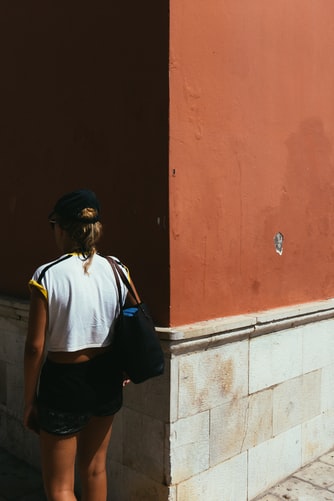A FOLKTALE IN LIGHT OF COVID-19
Hello! Corfu is calling. Before this call is answered, however, could you do us a (tiny) favour? We hope you are nodding your head in agreement because you are kindly asked to unclench your jaw and un-knit your brow. Does it feel better? Now, take a deep breath and allow us to take you on a journey to Corfu, the Ionian island off the coast of Greece.
Firstly, let us set the expectations right from the beginning of this ‘conversation-article.’ This is a story about tourism and its less popular sibling – sustainable tourism. Yes, it seems mundane, but we promise, it’s nothing short of a compelling story. There will be moments while reading when you might go, “Oh!” which is fair, and those feelings are not denied. But it is suggested, strongly, to not invest in those feelings. Rather, open your mind as well as heart and listen from a ‘local’s perspective’.

FROM TOO MANY TO TOO FEW: HOW THE PANDEMIC CHANGED TOURISM
See, we have just started, and you’re already finding yourself in the middle of a huddled city that has received and sent off worlds. Or at least it used to. Now, every noise dies down under some invisible curve of its cypress-studded hills. Only the ringing from the Corfutian church bells echoes back alongside the town’s empty streets. This is how the island of Corfu is experienced by its permanent residents in the summer of 2020 as the worldwide new virus has scared tourists into staying home.

Corfu, however, is not alone in this. Touristic hotspots all over Europe and the world have found themselves without tourists. In Rome for example, the immense street that runs from Rome’s Colosseum along the Forum is deserted, and Barcelona’s famous La Rambla has been reclaimed by the locals, for the first time in decades. This sharp decline in visitor numbers is the industry’s biggest nightmare as it means that hundreds of jobs in tourism are at risk.
Even though many fear that summer will not come to Europe this year; Spain, Greece and many touristic countries are meticulously planning on welcoming tourists back, starting this very July 2020. Despite the European Union’s action plan to open its internal borders and its tourism industry, no one knows if summer travellers will arrive, or how businesses will survive. Yet, there is hope as Europeans are already flocking to domestic seaside escapes, parks and cafes, with a bathing suit in one hand and a sunscreen in another.

TOURISM UNLEASHED
The pandemic has been useful in that it has revealed plenty – from educational inequality in Ghana to China-southeast Asia relations. The crisis has also pulled at the seams of the tourism industry or, more precisely, of overtourism – the less pleasant relative that no one has invited to the family dinner but is somehow there.
Overtourism is not a new concept, and perhaps we have all witnessed the occasional fight between a tourist and a local, oftentimes expressed by comically exaggerated gestures and curse words. If you have ever been to a popular destination such as France or Italy, you are surely all too familiar with it. This phenomenon became especially popular in 2017 as overtourism and tourismphobia became the buzzwords of that year. Both words have been heavily used in conjunction with sensationalist and oversimplified media narrative. Before we gobble down on this primordial soup of roughly chopped locals with a heaped tablespoon of tourists, let us watch the video below by José Mota – a famous Spanish comedian .
CITIES ARE TAKING MEASURES
This sketch is a parody of the tourismophobia phenomenon and overtourism, particularly in the old cities and urban centres of Spain. It is a product of its time. In 2017, the year that it was published, a significant people’s uprising was taking place, namely, Barcelona’s anti-tourist campaign. The campaign started as a protest against the influx of tourists into the city, and they grabbed media attention due to provocative statements and actions. Although this campaign might seem like a sour attempt of angry residents to scare tourists away, there is more to it than meets the eye.
The issue of overtourism is not solely a Spanish story but rather a worldwide one. It is a complex issue that is often oversimplified but has various impacts such as pricing out natives from their own towns. A lot of the blame has been assigned to platforms such as Airbnb; although, it is also the gap between the living cost and the working wages that drives the prices up. Other issues are the quality of life of locals and protecting the locals cultural identity.
Yet, the question remains – why would a culture or a city need saving in the first place ?
THE STRUGGLE FOR SUSTAINABLE TOURISM
The location of Corfu island has allowed its dwellers to sustain themselves from both fishing and farming, which has made the island and its villages privileged places to live. That is until popular culture came into the picture. It is well-known that popular culture can increase the touristic appeal, e.g. Dubrovnik in Croatia experienced a 10% rise in tourism in 2015 due to Game of Thrones. The same thing happened with Corfu back in the 1960s.
Gerald Durrell, a British naturalist, described his idle childhood on the island of Corfu in the book, My Family and Other Animals. The book piqued the interest of the British who started visiting the island as early as the 1960s. This set the cornerstone of tourism in the region. Nevertheless, what started as a beautiful symbiosis turned into a dysfunctional relationship by the end of 1980s. Benitses village, for example, was one of the first villages where tourists started flocking. It became a tourism mecca for the young and (not so) innocent of the 1980s. Soon, its architecture began changing, followed by a substantial shift in the value system of the islanders and the villagers alike.
Durrell held himself responsible for the tourist invasion and railed against the island’s (over)development. It was during those years when Corfu’s reputation seemed to change — and not for the better. As tourists were returning to their homelands, they began telling stories of drunks who drowned on boat trips, wrecked tavernas and terrorised villages. To make matters worse, in the 1980s, Benitses village was a favourite place for the happy-go-lucky mass tourism, often associated with hooliganism .

TOURISM: TWO SIDES OF THE SAME COIN
Fast forward to the present, the hordes of tourists have disappeared, leaving Benitses village, for example, to its original image of a family-oriented, peaceful fishing village. A lot more can be said about tourism’s adverse impacts; however, positive effects should not be neglected.
In the dry economic language, tourism provides jobs for the local people, and it boosts the local economy. From a human perspective, this means that the local population suddenly find themselves with an opportunity to pull themselves and their society out of poverty. Perhaps, this is the story of Bella Vista hotel, but it could also be the story of many others. Tourism could serve as an incentive for protecting the environment (e.g. wildlife tourism), it holds a cross-cultural value (e.g. UNESCO World Heritage), and it bridges otherwise clashing cultures. At the same time, tourism can cause environmental damage (e.g. last chance tourism), leading to commercialisation of culture, and promoting service economy with seasonal fluctuations .
BEYOND POLITICS : THE ‘KASSIOPI PROJECT’ AND THE BATTLE FOR ERIMITIS
An example of the two-sided nature of tourism is well-captured under the “Kassiopi project”. The 120 million-euro venture by a U.S. investment group is about constructing a five-star tourist resort on Erimitis – a part of the Natura 2000 network. This nature area in Corfu is of significant ecological value as it is a habitat of the European otter and serves as a stopover site of rare migratory birds. For those reasons, local environmental groups have created a Erimitis campaign that strongly opposes the development of the area for commercial purposes. While the environmental groups argue that the project will only benefit a handful such as the company and the Ministry of Finance of Greece, the stakeholders claim otherwise by saying that the development “…is truly sympathetic to the environment and to the local context ”. The project has sparked heated discussions on social media such as Facebook and Twitter.
The protests, surrounding Erimitis are similar to the protest against Batang Toru hydropower project in Indonesia, or the recent protests in Bulgaria against the over-construction on Black Sea’s coastline. Hence, the battle for Erimitis is universal as it poses the following question: Where is the balance between ecological consideration and growth dynamics?

FROM SUSTAINING TOURISM TO TOURISM SUSTAINABILITY
Using tourism as a scapegoat takes attention away from the realities of the multi-level crises. Restricting the number of tourists or tourism-related activities would do little to solve the root problem of worldwide inequality. Much like COVID-19, tourism exacerbates already existing issues. Therefore, rather than resorting to limiting tourism, countries could perhaps re-evaluate touristic policy. As the Deputy Minister of Tourism of Greece, Mr. Manos Konsolas says, the model of mass tourism is about to come to an end. The ongoing pandemic allows the world to reinvent travel, and we are a part of it .

DESTINATION SUSTAINABILITY
Here is where the story ends; as we are floating just off the coast of mainland Greece. This is also where we part, and I would like to thank you for joining us on this short journey of thoughts. Yet, there is one more thing we would like to leave you with.
Instead of asking whether to tour or not to tour; we should ask ourselves how to do so with eyes for the future .














